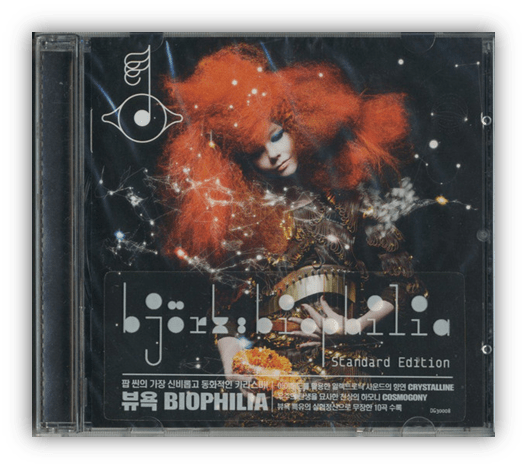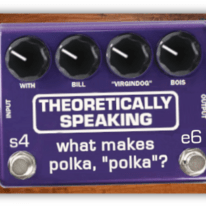When Icelandic songstress Björk made her pop debut in 1993, she sounded like a fully formed artist.

This was largely because she had been playing and recording music since childhood, jumping from one concept or band to the next for 15 or so years, until she finally stepped into the global spotlight with the delightfully quirky, catchy, and accessible Debut.
Still, despite the seeming perfection of her first solo album, Björk nevertheless changed her sound rather dramatically with every subsequent album.

- Post was a postmodern mix of moods and genres.

- Vespertine was all cozy warmth and kisses against icy choirs and micro-beats.

- Homogenic was cinematic, larger than life.
And yet, with each of those releases, Björk lost a little bit of her original fan base. Post was too arty and noisy compared to the simple bliss of her debut. Homogenic was too serious compared to the clever/cute Post. Vespertine was not only light on the fun, it was light on the stomping anthems.
And then came the later releases.
An album made from voices. An eco-themed “app” album. An album dedicated to her divorce. A post-apocalyptic female fantasy with flutes. A fungal themed album.

Even now, every new Björk album gets showered in critical acclaim, and gets a solid reception from her die-hard fans. That’s baked-in at this point. But with the release of these later albums, most of the original Bjork fans broke away for good.
Are those old fans missing something? Or is it Björk’s good sense that’s gone missing? Let’s dive into each album and see what’s what!
Medulla (2004)
The songs of Medulla were made almost entirely out of recorded human voices, albeit with noticeable electronic enhancement.

So you get choirs, beat-boxing, throat singing, and plenty of other flourishes made from tongues and throats. Naturally, you also get Björk showcasing her own vocal chops; crooning, cooing, and belting throughout.
Despite the bizarre production, there are some real gems here that even classic Björk fans can enjoy. “Who Is It” is a singalong anthem that could have fit on Post. “Oceania” amplifies the icy beauty of Vespertine, like a modern ballet piece for snow angels. “The Pleasure Is All Mine” may be the last time that Björk would ever tap into the seductive stylings of jazz crooners. And “The Triumph of a Heart” is just a lot of fun.

Structurally, Medulla reminds me of The Beach Boys’ Smiley Smile: it features a few grand set pieces which are connected by more fragmentary mood pieces. So while it feels a bit more slight overall in its songcraft than previous albums, it also flows together really nicely.
Aside from the slightness of some tracks, the only real flaw for me is that the production, while always interesting, can sometimes feel skeletal. For classic fans, there are a few really out-there tracks that may be difficult to get into. Me, I think they are spectacular and essential pieces of the whole.
The word “weird” can mean odd or witchy, and 2005’s Medulla embodies both senses of weird in equal measure. But witches sure know their charms as well.
Volta (2007)
Before its release Björk touted this album as a return to fun pop and dance music.
LOL! Debut and Post, this is not.
Volta is my least favorite of all of Björk’s albums.

I’m tempted to say it’s a bad album. It’s probably at least a bad Björk album. And as a pop or dance album, it’s a dud.
Lead single “Earth Intruders” was an early look into Volta’s problems. The song is a rhythmic sketch of a song buried under loud, clattering, and overstuffed production. Björk’s vocal melody is not memorable or emotionally resonant, and her lyrics are just bad. And this is one of the better tracks of the album!
There are some other worthwhile moments. “Declare Independence” is a techno stomper straight out of 1997.

“Wanderlust” has a great chorus, almost calling to mind her grand anthems of old. And some of the moodier, artier tracks are excellent, like “I See Who You Are” and “Vertebrae by Vertebrae.”
But so much of Volta is an ill-considered slog. It was Björk’s first misstep, a lapse in judgment. Medulla wasn’t even trying to be pop, but it has more accessible melodies and relatable emotions than this one. Thankfully, she would correct the course the next time around.
Biophilia (2011)
The gimmick of this album was that each song was designed for an interactive app, and also themed around the ecological and life sciences.

That always felt rather superficial to me. But at least the songs are good!
Fans of Vespertine should really give Biophilia a try. The songs here have a similar prettiness and romantic beauty. However, instead of icy electronic choir pop, this one feels a bit more like spacey folk.

The melodies are sweet but simple, the arrangements pleasant but spare. Except for a dramatic coda or two, there aren’t many progressions in the songs.
They tend to drift along gracefully and then end. Medulla sometimes gave the impression that Björk wanted to make sacred music, and Biophilia really builds on this feeling.
Still, “Crystalline” and “Mutual Core” qualify as bangers. And “Cosmogony” and “Virus” are some of the last great singable Björk melodies to be released. Even if it feels more like a soundtrack than a proper album, Biophilia is the last stop for any type of classic Björk feeling. Don’t sleep on it!
Vulnicura (2015)
And then everything fell apart. Not Björk’s career, but her family.

Vulnicura captures in painstaking and painful detail the disintegration of her relationship with the father of her child, her partner for over 13 years.
No, this is not a pleasant pop affair. With a roughly linear sequence to its tracks and severe strings throughout, the album almost has the feel of a challenging art film.

The sense of pathos is amplified by the chaotic beatscapes of Arca, who helped with production. There is catharsis to be found by the album’s end, but only after escaping a chasm of despair and numbness.
The closest Björk comes to the beauty of old is with opening track “Stonemilker,” a funereal cousin to Homogenic’s more solemn songs. “Quicksand” is also lovely, but more avant-garde.
All in all, it’s a great concept album, but definitely not for casual listeners.
Utopia (2017)
Utopia is mostly an album about moving on.

It’s about finding new love, a paradise to follow the hell of heartbreak.
Musically, Utopia is a rich sound-world. It features sonorous flutes, strange synth textures, and bird calls. All augmented by Arca’s dense beat collages.
The arrangements and sound production of Utopia are compelling. But these tracks don’t feel too much like songs. They feel like installation pieces.

“Blissing Me” is not too far from the simple prettiness of Biophilia, and there’s plenty of ethereal beauty to be had, especially “The Gate” and “Future Forever.” But people probably won’t be singing along to anything on Utopia.
It’s also way too long. 71 minutes! And a third of the album ventures back into Björk’s relationship hell, showing that utopias are merely aspirational.
Despite some truly inspired ideas, Björk’s need for an outside editing eye grows more dire. There’s a difference between pursuing one’s muse and getting lost in indulgence. Utopia has a perfect album hidden in the mess somewhere, plus a whole lot of other stuff.
Fossora (2022)
Björk described Fossora as “music for dancing to combat pandemic isolation.” After the confusion surrounding Volta, I was dubious about this similarly populist pitch.
And my suspicions proved well founded. Fossora is by no means a dance album. Or if so, it’s an album for dancing slowly by yourself in a dark cathedral, mourning the loss of your mother. Fun stuff, right?

Mostly, it’s another sound-world album, like a sequel to Utopia. This time, the theme is caves and fungal groves. There are some flutes, but horns are the new focus. And also some gabber beats to drill into your skull like jackhammers.
If you listen to this, be sure to play it on a good sound system. It is a phenomenal listen. The darkest track, “Victimhood,” makes you feel like you are stumbling down a pitch black cave. The more ethereal tracks are absolutely gorgeous.
In her singing, though, Björk isn’t catchy, anthemic, or even very expressive here. She hasn’t been so since Biophilia. The top melodies recall the flattened approach of Volta, and sometimes Vulnicura. In the songs dedicated to her mother’s passing, she sounds respectfully solemn.

But overall her singing style is much less relatable, emotionally speaking. The emotions mostly come from the arrangements and production.
And her top melodies are more interesting when gliding through her intricate instrumentation. In these last three albums, Björk has been more like a composer than a singer-songwriter.
But…a composer who really needs better quality control. Fossora is also too long, and has some very puzzling sequence choices. And while her recent focus has been confessional biography, she’s grown less poetic and more clumsy in her lyrics. I know she can do so much better, because she has done so!
So, contrary to most critical write-ups, I would say Björk’s recent record has been mixed.
I of course respect her right to follow her muse. And Björk’s most challenging songs are some of my favorites.

But still, I understand why her old fans are disappointed. More than that, part of me is disappointed as well!
I miss how Björk used to court larger audiences. Part of the brilliance of an album like Homogenic is how weird and challenging it could be, while still being mostly accessible.

Now she seldom bothers to wonder whether the broader public can keep up.
There’s no push and pull anymore; she just wanders where she will, untethered.
Even worse, I’m compelled to say that Björk is suffering a bit from unconditional praise with every album. Without constructive criticism to keep her in line, how can she ascertain when she misfires, or whiffs on execution? I daresay she can’t.
I do love her more daring sonic ideas, especially the recent sound-worlds she’s made.

But still, I long for Björk, the artist who actually cares about relating to people.
Not an impossible feat, but also probably not something to expect. She’s doing her own thing, and that’s fine. I’ll enjoy most of it.
More importantly, I’ll really enjoy the trove of treasures that she’s left behind all these years.

Let the author know that you liked their article with a “Green Thumb”





I’d like to give props to the Athens 2004 Olympic Committee for the brave decision of inviting Bjork to sing “Oceania” at the Opening Ceremony.
It brought the whole world together, as Olympic moments should: I distinctly remember the sensation of feeling 99% of the Earth’s population watching it and thinking together in unison: “WTF is this?”
https://www.youtube.com/watch?v=Canm7glYFgg
The last known evidence of Monoculture.
Getting ready for a long train ride home at the moment.
Just wanted to point out that the playlists embedded here are my own attempts to optimize each later Bjork album in terms of song flow and album length.
If there’s a chance for early Bjork fans to dig into these later albums, it’s via the edited playlists.
Hope you all make like Post-era Bjork and Enjoy!
Safe train travels. Mind the Björk.
Good work, Phylum! I’ve been a Björk fan since seeing The Sugarcubes on SNL but, yes, I’m one of those fans who keeps longing for another Debut or Post. I confess I listened to the first single from Fossora and didn’t bother with the rest. Still, I have an alert set up for whenever she announces new tour dates and I hope to see her at some point.
The album she put out when she was 11 is cute and she already had a great voice. It’s not required listening but her cover of “Fool On The Hill” in Icelandic is interesting though. Her pre-Sugarcubes bands Tappi Tíkarrass and Kukl are both worth seeking out if you’re into Post-Punk, and Jazz fans will like the Gling-Glo album she did post-Sugarcubes. It’s by far the most traditional thing she’s done.
I always go back to the Sugarcubes/Gling-Glo/Debut/Post period of her career. 90s Björk is the best Björk. Over the past year or so, she’s been doing DJ sets, so maybe that will inspire her to get back to making dance music. There’s always hope.
Also, Selmasongs, which is the soundtrack for Dancer In The Dark, is worth a couple listens. The movie is dark and tense and disturbing, but the soundtrack is lighter and can stand on its own.
Was it “Atopos” from Fossora? What terrible pick for a single! Again, some questionable judgment.
Still, I recommend at least going through some of the Spotify track previews. I’m sure you’ll stumble on some stuff to enjoy.
Yes, it was. I’ll have to check out the rest of the album.
I saw The Sparks Brothers documentary last night and need to dive into their discography, too. They might be a good candidate for this series….
I’m another that harks back to 9ps Bjork as her peak. On one hand I admire her having the freedom to do what she pleases but on the other, everything you say rings true.
I’ve seen her twice at festivals; during the mid 90s Debut era and then 2007 Glastonbury headlining the Other stage. It was wet and muddy and she had just released Volta but despite all that it remains one of my favourite festival shows. It was incredibly loud with a lot of headcrushing beats, it was definitely loaded towards dance bangers with the occasional more restrained interlude. She played four tracks from Volta including a one track encore of Declare Independence. Despite being new it was a glorious end with everyone into it. It felt like a continuation of the best of her 90s dance oriented tracks but in hindsight it was the end of the line.
Yeah, Declare Independence is like a fusion between her old song “Pluto” and Daft Punk’s “Rock & Roll,” both released in 1997. It’s an album highlight, for sure.
When Human Behavior off of Debut first exploded onto the radio, it totally grabbed my attention, as it sounded like nothing I had ever heard, starting with the timpani bass line. I loved it. I asked a friend who supposedly was into alternative music if he had heard of Björk and he said the name sounded like someone was throwing up. I realized his musical tastes had not quite caught up to 1993.
So when do we get to the point where your friend is jamming out to her instrumental tracks for Drawing Restraint 9?
I lost touch with him but I doubt that happened.
I remember the mid 90s media quandary here on how to pronounce Björk. Is it; B’yawk, Bi-jork (the Bi as in Big), B-jerk, B-jork, Be-yerk and many more. How can a five letter name cause such uncertainty?
Her foreign-ness, vocal idiosyncracies and outsider image made her a figure of fun for thkse who didn’t get her in much the same way as your friend.
Heh. Those are all wrong. It’s /pjœṛk/ according to Wikipedia.
You’re preaching to the converted. We all like or respect Bjork. In the real world, however, Bjork is always going to be that woman who wore the swan dress to the Oscars. Because some people are cruel.
If Bjork chose the path of relative basic-ness, just a straight-up rocker, she could have pulled that off, too. I didn’t realize how great “Motorcycle Mama” was until I heard the original version. Holy crap. Actually said holy crap when I heard Sailcat. An all-covers album from The Sugarcubes could have been Through the Looking Glass-great.
Hard agree that Bjork is a composer.
Sarah Kirkland Snider’s Penelope is my favorite Bjork-like album.
Anybody who has nice things to say about DEVO, I agree with. I wish I could give you a name. This writer pointed out that both DEVO and Bjork understood the importance of the music video better than most people. Something about creating an overall aesthetic, blah, blah, blah, unifying sound and image, lock and step, blah, blah, blah, the whole package.